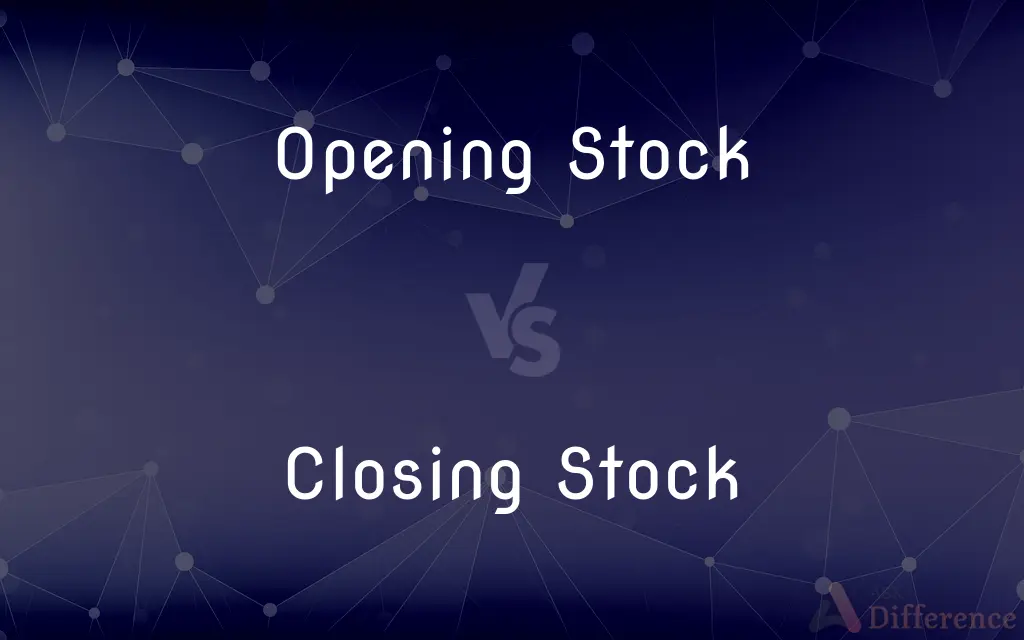Opening Stock vs. Closing Stock — What's the Difference?
By Tayyaba Rehman — Published on October 16, 2023
Opening Stock is the inventory at the start of a financial period, while Closing Stock is the inventory at its end.

Difference Between Opening Stock and Closing Stock
Table of Contents
ADVERTISEMENT
Key Differences
Opening Stock, in financial accounting, denotes the value of goods available for sale at the beginning of an accounting period. This is essentially the inventory carried over from the previous accounting period. It gives businesses a starting point for assessing inventory management and sales performance. Conversely, Closing Stock represents the value of unsold goods at the end of the accounting period.
Closing Stock provides insight into how well inventory is being managed and can indicate if there's an excess or shortage. It's vital for determining the cost of goods sold and ultimately the profitability of a business. Whereas the Opening Stock helps in determining the beginning inventory level, the Closing Stock will serve as the Opening Stock for the subsequent accounting period.
Both Opening Stock and Closing Stock play crucial roles in the financial management of a business. While Opening Stock offers a glimpse into the previous period's unsold inventory, Closing Stock gives a snapshot of the present situation, setting the stage for future forecasting. The difference between the two can also reflect the efficiency of sales and inventory turnover during the accounting period.
The process of inventory management is iterative, with the Closing Stock of one period becoming the Opening Stock of the next. It's important for businesses to accurately value both, as they impact financial statements and provide valuable insights for decision-making. In essence, Opening Stock sets the stage, and Closing Stock reveals the performance.
Comparison Chart
Timing
Start of an accounting period.
End of an accounting period.
ADVERTISEMENT
Derived From
Closing Stock of the previous period.
Actual unsold inventory at period end.
Impact on COGS
Added to determine cost of goods sold (COGS).
Subtracted to determine COGS.
Indication
Beginning inventory level.
Efficiency of sales and inventory turnover.
Relevance for Next Period
Sets inventory valuation baseline.
Becomes the Opening Stock for the next accounting period.
Compare with Definitions
Opening Stock
Starting point for inventory valuation in an accounting term.
The accountant confirmed the Opening Stock before calculating monthly expenses.
Closing Stock
Value of remaining inventory after an accounting cycle.
The finance team assessed the Closing Stock to finalize the monthly profit and loss statement.
Opening Stock
Goods available for sale at an accounting period's commencement.
Given the strong sales last month, the Opening Stock was surprisingly high.
Closing Stock
Inventory value setting the stage for the next period's Opening Stock.
The Closing Stock value will be the starting point for next month's financial assessment.
Opening Stock
Previous period's unsold inventory brought into the current period.
The high Opening Stock indicated sluggish sales in the previous quarter.
Closing Stock
Unsold goods at an accounting period's conclusion.
A review of the Closing Stock revealed excess items that were not in demand.
Opening Stock
Inventory at the start of a financial period.
The company's Opening Stock was valued at $10,000, carried over from last year.
Closing Stock
Inventory at the end of a financial period.
With slow-moving products, the company's Closing Stock was higher than anticipated.
Opening Stock
Initial value of inventory for a specific accounting cycle.
The Opening Stock was assessed to ensure accurate financial reporting.
Closing Stock
Snapshot of stock level for future forecasting.
The Closing Stock was used to gauge sales efficiency and adjust future procurement.
Common Curiosities
What insights can Closing Stock provide?
It can indicate sales efficiency, inventory turnover, and guide future procurement decisions.
How is Closing Stock defined?
Closing Stock is the value of unsold inventory at the end of an accounting period.
Is there a connection between the two?
Yes, the Closing Stock of one period typically becomes the Opening Stock of the next period.
Why is Opening Stock essential?
Opening Stock sets the baseline for inventory valuation and affects the calculation of cost of goods sold.
What does Opening Stock represent?
Opening Stock represents the inventory value at the start of an accounting period.
Share Your Discovery

Previous Comparison
Washington vs. Washington DC
Next Comparison
AAC vs. MP3Author Spotlight
Written by
Tayyaba RehmanTayyaba Rehman is a distinguished writer, currently serving as a primary contributor to askdifference.com. As a researcher in semantics and etymology, Tayyaba's passion for the complexity of languages and their distinctions has found a perfect home on the platform. Tayyaba delves into the intricacies of language, distinguishing between commonly confused words and phrases, thereby providing clarity for readers worldwide.












































